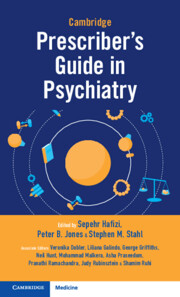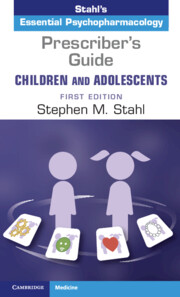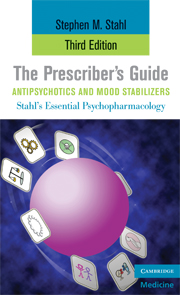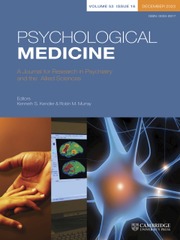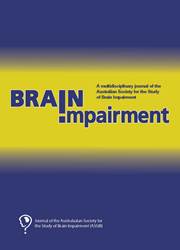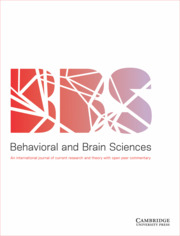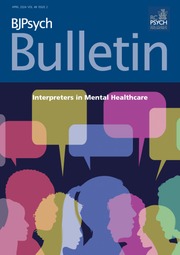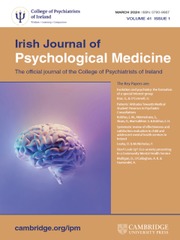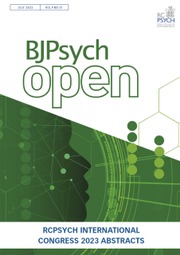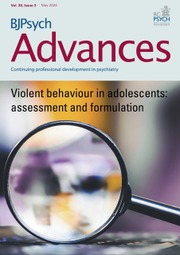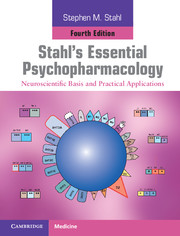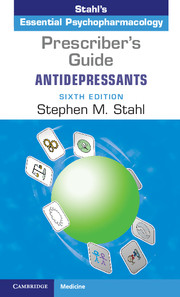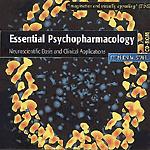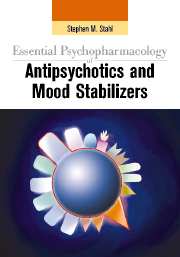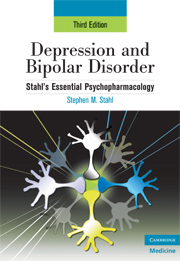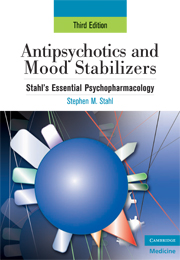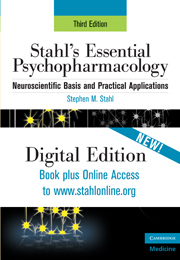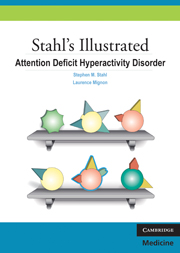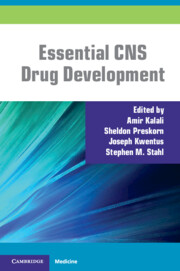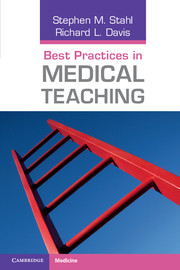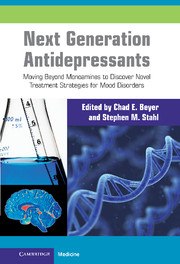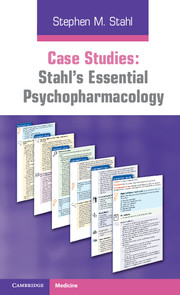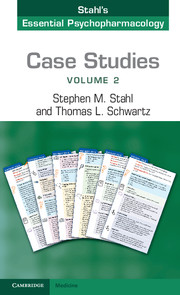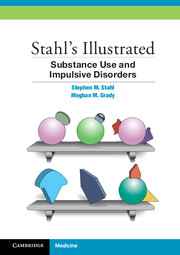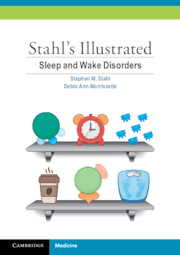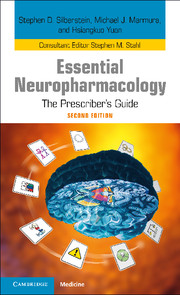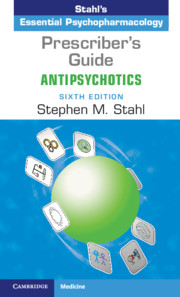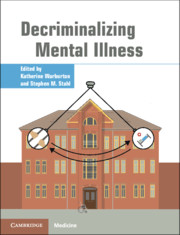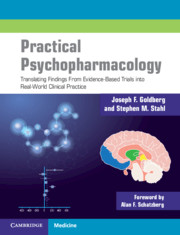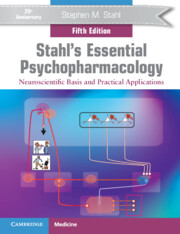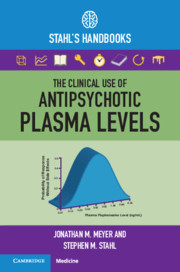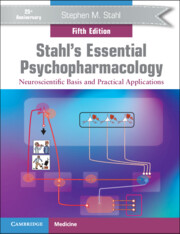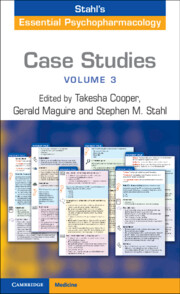Cambridge Prescriber's Guide in Psychiatry
- Editors:
- Sepehr Hafizi, Cambridgeshire and Peterborough NHS Foundation Trust and University of Cambridge
- Peter B. Jones, University of Cambridge
- Stephen M. Stahl, University of California, San Diego
- Date Published: November 2023
- availability: Available
- format: Paperback
- isbn: 9781108986588
Paperback
Other available formats:
eBook
Looking for an inspection copy?
This title is not currently available for inspection. However, if you are interested in the title for your course we can consider offering an inspection copy. To register your interest please contact [email protected] providing details of the course you are teaching.
-
Based on the best-selling Stahl's Prescriber's Guide, this essential guide to psychiatric prescribing has been developed by leading psychiatrists and medical students from the University of Cambridge to support all mental health professionals in achieving optimal care for their patients. Written with the authority of evidence and the guidance of clinical wisdom the formulary covers the psychotropic medications used in daily care including dosing recommendations and drug interactions. With its easy-to-use, full-colour template-driven navigation system, the book combines evidence-based data with clinically informed advice, including guidance on prescribing for children and adolescents and people with addictions. Drugs are presented in the same format to facilitate rapid access to information and are broken down into sections designated by a unique colour background thereby clearly distinguishing information presented on therapeutics, side effects, dosing and use, and the art of psychopharmacology. Popular prescribing 'tips and pearls are included throughout.
Read more- Presented in a templated format, fully indexed and cross-referenced for ease of navigation including invaluable clinical tips and pearls with each entry
- Includes dosing guidelines alongside the authors' educated and respected opinions regarding potential advantages and disadvantages of each drug
- Indices provide generic and proprietary drug names, and generic drugs by use and class
Reviews & endorsements
'In the past decade or so, not only has there been a better awareness of psychiatric disorders, but increasingly larger numbers of people are seeking help for these conditions. There is indeed a better focus on personalised psychiatry and pharmacological research. With further recent advances in innovations and better medications, practice of clinical psychiatry is changing with greater hope to patients and their families and carers. In this volume Cambridge Prescribers Guide in Psychiatry, authors have brought together key essentials about medications used in treatments in psychiatry in an impressively coherent and comprehensive manner. The authors deserve our thanks and congratulations on an impressive effort to bring together evidence-based information on how to use medicine and drug interventions which will go a long way in improving outcSepomes for patients and their carers as well as families.' Dinesh Bhugra, CBE, Professor Emeritus, Mental Health & Cultural Diversity, IoPPN, Kings College, London
See more reviews'Finally, a colourful handbook about medication in use in psychiatry that you could look up quickly in the field like a bird-watcher guide. Modern clinical practice involves a reflective integration of psychopharmacology with psychosocial interventions that depend on a good grasp of the brain mechanism behind the medication used. It is particularly reassuring to learn that this book is the product of coordinated crowd-sourcing of clinical students, active clinicians, as well as neuroscience experts. In particular, the unique section on the Art of Psychopharmacology for each medication presents the wisdom of practising clinicians which has hitherto largely been confined to clinical supervision in specialist apprenticeships. This work will find its place in the pockets of busy clinicians and will be a reliable source of information for students, healthcare professionals, patients and carers.' Eric Chen, MA(Oxon), MBChB(Edin), MD(Edin), FRCPsych(UK), FHKAM(Psychiatry), The University of Hong Kong
'The Cambridge Prescriber's Guide in Psychiatry will support informed and inclusive decisions about psychiatric medication as the basis of better outcomes for patients. The collaborative authorship combines Cambridgeshire & Peterborough's experienced NHS consultants, psychopharmacologists and pharmacists with the inquiring minds of our student doctors: an innovative example of why it is so rewarding to practise psychiatry in an academic teaching trust environment. The Cambridge Prescriber's Guide in Psychiatry will help make that inquisitive, evidence-based approach more widely available to prescribers in mental health care.' Cathy Walsh, Chief Medical Officer, Cambridgeshire and Peterborough NHS Foundation Trust
'From Acamprosate to Zuclopenthixol – The Cambridge Prescriber's Guide in Psychiatry is what it says on the tin. Crystal clear information that prescribers need – to not only prescribe safely and effectively in terms of dosing and side effects but also to understand the underlying mechanism of action. Neat colour coded sections with easy to access bullet point lists of key information makes the guide an easy-to-use reference tool and psychopharmaco-pedia rolled in one. The inclusion of compound medications (e.g. Buprenorphine and Naoloxone) in the guide is especially welcome lending credence to the title of the guide as a Prescriber's guide. Overall, the various sections are guaranteed to make every medication choice discussion with the patient an intellectually stimulating encounter and one that should result in a more rational, more safe prescribing practice – win-win for both patients and prescribers.' Subodh Dave, Dean, Royal College of Psychiatrists
'This high-quality book is used in my clinical practice and is often the first stop for referencing dosing, interactions, side effects, and clinical pearls. There are several psychopharmacology reference books, but this guide strikes the ideal balance of depth and efficiency.' Daniel Michael Tuinstra, Doody's Reviews
Customer reviews
Not yet reviewed
Be the first to review
Review was not posted due to profanity
×Product details
- Date Published: November 2023
- format: Paperback
- isbn: 9781108986588
- length: 720 pages
- dimensions: 226 x 141 x 34 mm
- weight: 1.09kg
- availability: Available
Table of Contents
Introduction
List of icons
1. Acamprosate calcium
2. Agomelatine
3. Alprazolam
4. Amisulpride
5. Amitriptyline hydrochloride
6. Aripiprazole
7. Asenapine
8. Atomoxetine
9. Benperidol
10. Buprenorphine
11. Buprenorphine with naloxone
12. Bupropion hydrochloride
13. Buspirone hydrochloride
14. Carbamazepine
15. Cariprazine
16. Chlordiazepoxide hydrochloride
17. Chlorpromazine hydrochloride
18. Citalopram
19. Clomipramine hydrochloride
20. Clonazepam
21. Clonidine hydrochloride
22. Clozapine
23. Dexamfetamine sulfate
24. Diazepam
25. Disulfiram
26. Donepezil hydrochloride
27. Dosulepin hydrochloride
28. Doxepin
29. Duloxetine
30. Escitalopram
31. Esketamine
32. Flumazenil
33. Fluoxetine
34. Flupentixol
35. Flurazepam
36. Fluvoxamine maleate
37. Gabapentin
38. Galantamine
39. Guanfacine
40. Haloperidol
41. Hydroxyzine hydrochloride
42. Hyoscine hydrobromide
43. Imipramine hydrochloride
44. Isocarboxazid
45. Lamotrigin
46. Levomepromazine
47. Lisdexamfetamine mesylate
48. Lithium
49. Lofepramine
50. Loprazolam
51. Lorazepam
52. Loxapine
53. Lurasidone hydrochloride
54. Melatonin
55. Memantine hydrochloride
56. Methadone hydrochloride
57. Methylphenidate hydrochloride
58. Mianserin hydrochloride
59. Midazolam
60. Mirtazapine
61. Moclobemide
62. Modafinil
63. Nalmefene
64. Naltrexone hydrochloride
65. Nitrazepam
66. Nortriptyline
67. Olanzapine
68. Oxazepam
69. Paliperidone
70. Paroxetine
71. Phenelzine
72. Pimozide
73. Prazosin
74. Pregabalin
75. Prochlorperazine
76. Procyclidine hydrochloride
77. Promethazine hydrochloride
78. Propranolol hydrochloride
79. Quetiapine
80. Reboxetine
81. Risperidone
82. Rivastigmine
83. Sertraline
84. Sodium oxybatate
85. Sulpiride
86. Temazepam
87. Tetrabenazine
88. Tranylcypromine
89. Trazodone hydrochloride
90. Trifluoperazine
91. Trihexyphenidyl hydrochloride
92. Trimipramine
93. Tryptophan
94. Valproate
95. Varenicline
96. Venlafaxine
97. Vortioxetine
98. Zolpidem tartrate
99. Zopiclone
100. Zuclopenthixol
101. Medicines and Driving
Index.
Sorry, this resource is locked
Please register or sign in to request access. If you are having problems accessing these resources please email [email protected]
Register Sign in» Proceed
You are now leaving the Cambridge University Press website. Your eBook purchase and download will be completed by our partner www.ebooks.com. Please see the permission section of the www.ebooks.com catalogue page for details of the print & copy limits on our eBooks.
Continue ×Are you sure you want to delete your account?
This cannot be undone.
Thank you for your feedback which will help us improve our service.
If you requested a response, we will make sure to get back to you shortly.
×
